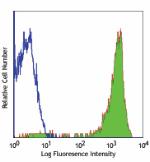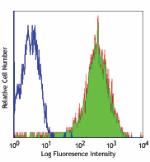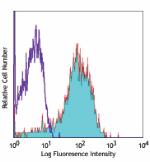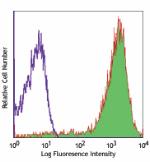- Clone
- HI186 (See other available formats)
- Regulatory Status
- RUO
- Workshop
- HCDM listed
- Other Names
- Cambridge pathology antigen 1 (CAMPATH-1), epididymal secretory protein 1
- Isotype
- Mouse IgG2a, κ
- Ave. Rating
- Submit a Review
- Product Citations
- publications
| Cat # | Size | Price | Quantity Check Availability | Save | ||
|---|---|---|---|---|---|---|
| 316009 | 25 tests | £121 | ||||
| 316010 | 100 tests | £262 | ||||
CD52, also known as Cambridge pathology antigen 1 (CAMPATH-1), is a 25-29 kD glycoprotein containing a large N-linked carbohydrate moiety. The actual molecule of CD52 is only 8-9 kD. It is expressed in the male reproductive tract and on virtually all lymphocytes (T and B cells), as well as macrophages/monocytes, eosinophils, and red cells. CD52 is thought to play a role in carrying and orienting carbohydrates. CD52 is a potent target for complement-mediated lysis and antibody-mediated cellular cytotoxicity and has been used as a depletion target for chronic lymphocytic leukemia (CLL)/lymphoma and immunosuppression. The HI186 antibody is useful for flow cytometry and immunohistochemistry.
Product DetailsProduct Details
- Verified Reactivity
- Human
- Reported Reactivity
- Cynomolgus, Rhesus
- Antibody Type
- Monoclonal
- Host Species
- Mouse
- Immunogen
- Human tonsil
- Formulation
- Phosphate-buffered solution, pH 7.2, containing 0.09% sodium azide and BSA (origin USA)
- Preparation
- The antibody was purified by affinity chromatography and conjugated with PerCP/Cyanine5.5 under optimal conditions.
- Concentration
- Lot-specific (to obtain lot-specific concentration and expiration, please enter the lot number in our Certificate of Analysis online tool.)
- Storage & Handling
- The antibody solution should be stored undiluted between 2°C and 8°C, and protected from prolonged exposure to light. Do not freeze.
- Application
-
FC - Quality tested
- Recommended Usage
-
Each lot of this antibody is quality control tested by immunofluorescent staining with flow cytometric analysis. For flow cytometric staining, the suggested use of this reagent is 5 µl per million cells in 100 µl staining volume or 5 µl per 100 µl of whole blood.
* PerCP/Cyanine5.5 has a maximum absorption of 482 nm and a maximum emission of 690 nm. - Excitation Laser
-
Blue Laser (488 nm)
- Application Notes
-
Additional reported applications (for the relevant formats) include: immunohistochemical staining of formalin-fixed paraffin-embedded tissue sections.
-
Application References
(PubMed link indicates BioLegend citation) -
- Kishimoto T, et al. Eds. 1997. Leucocyte Typing VI. Garland Publishing Inc. London.
- Product Citations
-
- RRID
-
AB_2650806 (BioLegend Cat. No. 316009)
AB_2650806 (BioLegend Cat. No. 316010)
Antigen Details
- Structure
- Unusually small glycopeptide containing N-linked carbohydrate moiety, GPI-linked membrane protein, approximate molecular weight 7 kD
- Distribution
-
Male reproductive tract (epididymis, seminal vesicle), T cells, B cells, macrophage/monocyte, eosinophil, erythrocytes, malignant lymphocytes
- Function
- Thought to play a role in carrying and orienting carbohydrates. Target for complement-mediated lysis and antibody-dependent cellular cytotoxicity, used as a depletion target for chronic lymphocytic leukemia/lymphoma therapy and immunosuppression.
- Cell Type
- B cells, Eosinophils, Erythrocytes, Macrophages, Monocytes, T cells
- Biology Area
- Costimulatory Molecules, Immunology
- Molecular Family
- CD Molecules
- Antigen References
-
- Leukocyte Typing VI. Kishimoto T, et al. (Eds.) Garland Publishing Inc. (1997)
- Xia MQ, et al. 1991. Eur. J. Immunol. 21:1677.
- Kirchhoff C, et al. 1993. Mol. Reprod. Dev. 34:8.
- Xia MQ, et al. 1993. Biochem. J. 293:633.
- Gene ID
- 1043 View all products for this Gene ID
- UniProt
- View information about CD52 on UniProt.org
Related FAQs
- How stable is PerCP/Cyanine5.5 tandem as compared to PerCP alone?
-
PerCP/Cyanine5.5 is quite photostable and also better than PerCP alone in withstanding fixation.
Other Formats
View All CD52 Reagents Request Custom Conjugation| Description | Clone | Applications |
|---|---|---|
| PE/Cyanine7 anti-human CD52 | HI186 | FC |
| Purified anti-human CD52 | HI186 | FC,IHC-P |
| FITC anti-human CD52 | HI186 | FC |
| PE anti-human CD52 | HI186 | FC |
| APC anti-human CD52 | HI186 | FC |
| APC/Fire™ 750 anti-human CD52 | HI186 | FC |
| PerCP/Cyanine5.5 anti-human CD52 | HI186 | FC |
| PE/Dazzle™ 594 anti-human CD52 | HI186 | FC |
| TotalSeq™-A0033 anti-human CD52 | HI186 | PG |
| TotalSeq™-C0033 anti-human CD52 | HI186 | PG |
| PE/Cyanine5 anti-human CD52 | HI186 | FC |
| TotalSeq™-B0033 anti-human CD52 | HI186 | PG |
| TotalSeq™-D0033 anti-human CD52 | HI186 | PG |
Compare Data Across All Formats
This data display is provided for general comparisons between formats.
Your actual data may vary due to variations in samples, target cells, instruments and their settings, staining conditions, and other factors.
If you need assistance with selecting the best format contact our expert technical support team.
-
PE/Cyanine7 anti-human CD52
-
Purified anti-human CD52

Human peripheral blood lymphocytes stained with purified HI1... -
FITC anti-human CD52

Human peripheral blood lymphocytes stained with HI186 FITC -
PE anti-human CD52

Human peripheral blood lymphocytes stained with HI186 PE -
APC anti-human CD52

Human peripheral blood lymphocytes stained with HI186 APC -
APC/Fire™ 750 anti-human CD52
-
PerCP/Cyanine5.5 anti-human CD52
-
PE/Dazzle™ 594 anti-human CD52
-
TotalSeq™-A0033 anti-human CD52
-
TotalSeq™-C0033 anti-human CD52
-
PE/Cyanine5 anti-human CD52
-
TotalSeq™-B0033 anti-human CD52
-
TotalSeq™-D0033 anti-human CD52
 Login / Register
Login / Register 













Follow Us